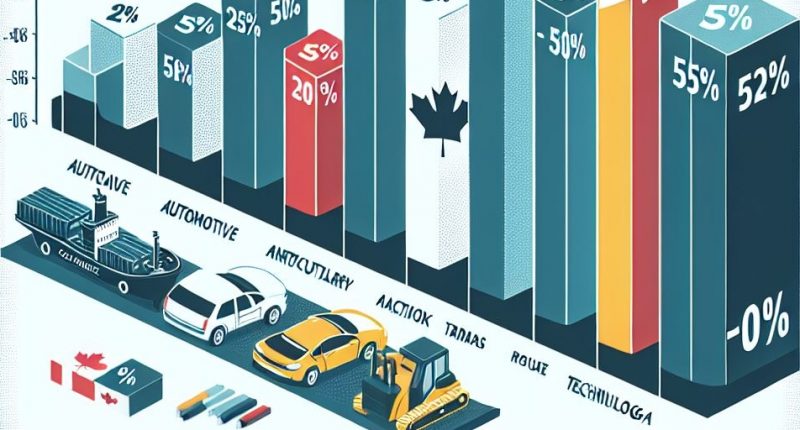- The recent announcement of a 25 per cent tariff on Canadian imports by the U.S. has significant implications for investors in both Canadian and U.S. stocks
- Canada is a major exporter of oil to the U.S. A 25 per cent tariff on oil could reduce demand from U.S. refineries, potentially lowering revenues for Canadian energy companies
- U.S. automakers who rely on Canadian parts, could face higher production costs
- Investors might consider diversifying their portfolios to include stocks from regions less affected by the tariffs
The recent announcement of a 25 per cent tariff on Canadian imports by the U.S. has significant implications for investors in both Canadian and U.S. stocks. This policy, aimed at addressing issues related to immigration and drug trafficking, could have far-reaching economic consequences. Here’s a detailed look at how this tariff might impact various sectors and stocks.
1. Canadian exporters
Key sectors affected
- Energy: Canada is a major exporter of oil to the U.S. A 25 per cent tariff on oil could reduce demand from U.S. refineries, potentially lowering revenues for Canadian energy companies like Suncor Energy (TSX:SU) and Canadian Natural Resources (TSX:CNQ).
- Automotive: The automotive sector, including companies like Magna International (TSX:MG) could face reduced competitiveness in the U.S. market due to higher costs, leading to potential declines in sales and stock prices.
- Forestry and Agriculture: Tariffs on wood, paper, and agricultural products could increase costs for U.S. buyers, reducing demand and impacting companies like West Fraser Timber (TSX:WFG) and Nutrien (TSX:NTR).
Stock market impact
- Short-term: Expect volatility as markets react to the news. Stocks of companies heavily reliant on U.S. exports may see immediate declines.
- Long-term: Companies might seek to diversify their markets, but this could take time and involve significant costs.
2. U.S. importers
Key sectors affected
- Automotive: U.S. automakers like General Motors (NYSE:GM) and Ford (NYSE:F), which rely on Canadian parts, could face higher production costs. This might lead to increased vehicle prices, potentially reducing sales.
- Retail and consumer goods: Higher costs for imported goods could lead to increased prices for consumers, affecting companies like Walmart (NYSE:WMT) and Target (NYSE:TGT) that sell Canadian products.
Stock market impact
- Short-term: Retail and automotive stocks might experience a dip as investors anticipate higher costs and potential declines in consumer spending.
- Long-term: Companies may look to source products domestically or from other countries, which could mitigate some of the impacts but also involve restructuring costs.
3. Broader economic implications
Inflation and consumer spending
- Inflation: The tariffs are likely to increase the prices of goods imported from Canada, contributing to higher inflation in the U.S. This could lead to reduced consumer spending, impacting a wide range of sectors.
- Consumer sentiment: Higher prices might dampen consumer sentiment, leading to lower spending and slower economic growth.
Trade relations and retaliation
- Retaliation: Canada might impose retaliatory tariffs on U.S. goods, further straining trade relations and impacting U.S. exporters.
- Supply chain disruptions: Companies might face disruptions as they adjust their supply chains to mitigate the impact of tariffs.
Investment strategies
Diversification
- Geographic diversification: Investors might consider diversifying their portfolios to include stocks from regions less affected by the tariffs.
- Sector diversification: Focusing on sectors less impacted by trade tensions, such as technology and healthcare, could provide stability.
Monitoring policy changes
- Stay informed: Keep an eye on policy developments and potential negotiations that could alter the tariff landscape.
- Adjusting portfolios: Be prepared to adjust investment strategies based on new information and market reactions.
The art of the deal
The 25 per cent tariff on Canadian imports is poised to create significant challenges for both Canadian exporters and U.S. importers. Investors should brace for increased market volatility and consider strategies to mitigate risks, such as diversification and staying informed about policy changes. While the immediate impact may be negative, long-term adjustments and strategic planning can help navigate these turbulent times.
The material provided in this article is for information only and should not be treated as investment advice. For full disclaimer information, please click here.
(Top image generated with AI)


